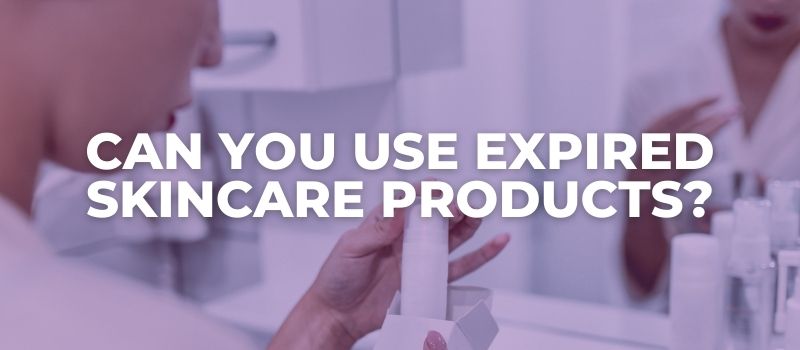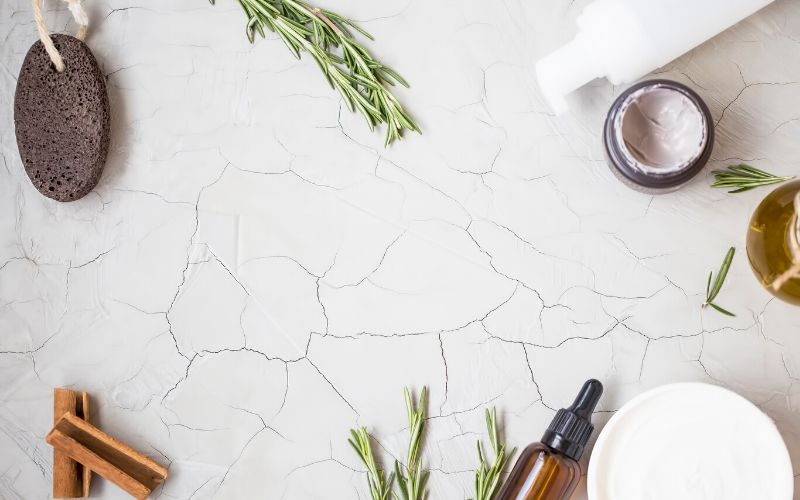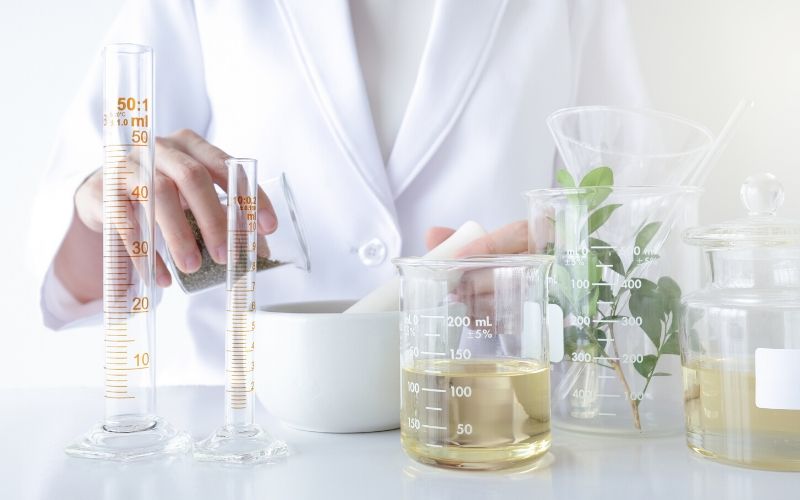Deciding how long to keep that miracle serum that saved your skin when you needed it or when to toss your go-to sunscreen can be confusing, and we’ve all been there.
Experts urge that hanging on to beauty products past their prime isn’t a good idea, but how bad can it really be?
Can skincare products go bad?
Yes, skincare products can go bad, and you should avoid using expired cosmetics.
The reason for this is that some products may not work as well once expired, while others can cause irritation, rashes, and skin damage.
Here’s what you need to know about how long you should keep your skincare products and when to throw them away.

How Long Does Unopened Skincare Last?
Unopened skincare products last from 1 to 3 years.
This is because most cosmetic manufacturers will do accelerated stability testing that includes microbial testing to ensure that when the products are sealed, no air, bacteria, and pollutants have entered and possibly contaminated the formula.
Therefore, most unopened skincare products will be just as good as the day they were made for up to three years, provided they have been stored correctly.
This means keeping them in a cool, dry place away from direct sunlight, as extreme temperatures and exposure to sunlight can degrade the active ingredients in skincare products, reducing their effectiveness.
Additionally, it’s important to note that the shelf life of unopened skincare products can vary greatly depending on their ingredients and packaging.
Products with natural ingredients tend to have a shorter shelf life than synthetic ones because natural ingredients can degrade more quickly.
How Long Does Opened Skincare Last?

Once opened, the lifespan of skincare products can vary significantly depending on the specific product and its ingredients.
However, as a general rule, most liquid and cream skincare products last up to 1 year after they’ve been opened, while powders last up to 2 years after they’ve been opened.
Most skincare products are easy to notice when they expire.
For example, liquids and creams change the pigment, texture, and scent once expired.
On the other hand, powders may start to separate and become crumbly when it’s time to toss them out.
They may also become less pigmented and more difficult to apply smoothly.
However, not all products exhibit clear signs of expiration.
Therefore, to ensure you’re not applying an expired product that can harm your skin but doesn’t necessarily show apparent signs of going bad, you should check the code at the back of the product and look for a round jar printed with a number that represents the number of months the product can be used once opened.
But, if you already threw the box away and can’t figure out if that product you haven’t used in a while is still good, here’s a list of exactly how long your coveted items last:
Cleanser: 6-8 Months
Though most cleansers are formulated to last over two years, there is no federal regulation or clear guidelines establishing expiration dates.
Although there will probably be signs that your cleanser has gone bad, there is no reason for you to wait until that happens.
If you want to use a face wash at its most active, throw it away 6-8 months after opening.
Moreover, cleansers can be a little tricky, as they are often kept in the bathroom in wet conditions, which can cause bugs that tend to grow faster in water to stick to the packaging, especially around the opening.
This can cause the product to collect dirt and pathogens on its way out of the bottle, which will get transferred onto your skin and create a potential for bacterial growth and reproduction.
What happens if you use expired face wash?
Using expired face wash may not be harmful in the sense of causing severe health issues, but it can lead to skin problems.
The active ingredients in face washes begin to degrade around six months after opening, which means they could become less effective.
In some cases, ingredients that are no longer stable may cause a reaction, such as irritation or allergic reactions, which could manifest as redness, itching, or breakouts.
Toners: 12 Months
Toners can last up to 12 months, especially if sealed properly and kept in a cool, dry place.
While regular hydrating toner can sometimes be used for over twelve months, toners that contain active ingredients such as AHAs and BHAs shouldn’t be used longer than that, as the active ingredients can degrade and lose their effectiveness over time.
Can you use expired toner?
While using expired toner is unlikely to cause severe harm, it’s generally not recommended.
Some ingredients in toners, such as exfoliating acids, can not only degrade and lose their effectiveness but can also cause irritation and trigger inflammatory skin reactions.
Serums: 6-12 Months
Serums, especially those with active ingredients like retinols, vitamin C, or exfoliating acids such as glycolic acid, salicylic acid, and mandelic acid, usually have a 6 to 12-month shelf life.
This is because these powerful ingredients are unstable and can break down over time, reducing the product’s effectiveness.
Signs that your serum has expired or gone bad include changes in color, texture, or smell.
For instance, vitamin C and retinol serums may turn yellow or brown when they oxidize and are no longer effective.
On the other hand, serums containing exfoliating acids may start to smell bad and change in texture, but they can also begin to sting or burn when applied to the skin.
Can you use expired serum?
Serums most often contain active ingredients, which is why it’s not recommended to use them past their expiration date.
The active ingredients in serums can degrade and lose their effectiveness over time but could also potentially lead to skin issues.
Expired active ingredients might cause irritation, inflammation, or even allergic reactions, especially if the active ingredients have become unstable.
Furthermore, bacterial growth is a risk with expired products, especially with serums, as they often come in a liquid form and must be opened to be applied, exposing the formula to air and any bacteria or germs present in the environment.
Even though skincare products contain preservatives to prevent this, the preservatives themselves can lose their effectiveness over time.
Moisturizer: 6-12 Months
Moisturizers typically last for 6 months in a jar packaging and up to 12 months in an airtight bottle.
The lifespan of these products often depends most on the packaging and the active ingredients inside the formula.
For example, moisturizers that come in a jar and require constant opening cause the formula to be exposed to air, heat, light, and bacteria on your fingers and from the environment, which contributes to making the product less effective.
On the other hand, moisturizers in airtight pump packaging can last up to twelve months, as this formula is protected from environmentally-caused degradation.
However, you still need to watch for changes in the color, texture, or smell of your moisturizer, as changes in these can be signs that the product has expired.
If your moisturizer starts to separate, develops a strange smell, or changes color, it’s probably time to replace it.
What happens if you use expired face moisturizer?
Not only can expired moisturizers become less effective over time, but they can also potentially cause irritation and allergic reactions.
Additionally, expired moisturizers can cause acne as some ingredients in the formula can oxidize and harden, making them more likely to clog pores and lead to breakouts.
Sunscreen: 12 Months-3 Years
Like most skincare products, facial sunscreens can last up to 12 months.
On the other hand, body sunscreens can last up to 3 years after buying them from the store.
This is because manufacturers formulate sunscreen products with ingredients that are less prone to rapid degradation.
They are also often packaged in airtight and opaque containers, which helps protect the product from exposure to air and light, two factors that can accelerate the degradation of many skincare ingredients.
However, the actual shelf life can vary depending on the specific formulation and storage conditions.
For instance, sunscreens that contain organic (also known as chemical) sun filters may not last as long as those with inorganic (also called physical) sun filters like zinc oxide and titanium dioxide, which are generally more stable.
Sunscreens intended for the body, on the other hand, have longer expiration dates and are made to last from one season to the following two, as people don’t use sunscreens on their bodies 365 days a year.
Can you use expired sunscreens?
It is not recommended to use expired sunscreens as they may not provide the UV protection written on the packaging, and the effectiveness will likely be significantly reduced.
This means you could be more prone to sunburns, sun damage, and skin problems than using a non-expired product.
Self-Tanners: 6-12 Months
A self-tanner in a jar usually has a shelf life of 6-9 months. If the container has a pump, 12 months is the average shelf life because it is enclosed and tightly sealed.
Can you use expired self-tanner?
Typically, expired self-tanners become ineffective and may not provide the desired tanning effect.
This is because the pigments may have broken down over time and cannot penetrate the skin effectively to produce the desired color.
However, using expired self-tanners may cause mild side effects, including temporary redness and possible blemishes, particularly in acne-prone areas such as the face, back, chest, and buttocks.
Is It Okay To Use Expired Skincare Products?

No, using expired skincare products is not okay because their ingredients degrade over time, reducing their effectiveness and potentially causing skin irritation and other adverse reactions.
When you are using your products, you are also exposing them to air and light, and this can cause the products to oxidize.
Or, in simple terms, oxidation means “go rancid.”
From a chemistry point of view, oxidation refers to the process by which a compound loses electrons.
When it comes to skincare products, this means that the active ingredients in a product can break down and lose their potency.
This can also change the formula and consistency of the product.
At best, a product that has oxidized will be less effective.
But the worst-case scenario is that it may actually be bad for your skin.
For example, applying oxidized vitamin C can cause blackheads, which are oxidized sebum.
Additionally, vitamin C, along with other beauty favorites, including retinol, tretinoin, hyaluronic acid, niacinamide, mandelic acid, and glycolic acid, are all relatively unstable ingredients if left exposed to oxygen.
While buying products in a tube with a pump or airtight jars can somewhat guarantee the products you buy from the store will last you slightly longer, it is still the best recommendation to get rid of expired products instead of trusting them with your skin.
Is It Okay To Use Unopened Skincare Products That Have Expired?
Yes, it is generally okay to use unopened skincare products that have expired.
The shelf life of unopened skincare products can be up to three years and longer if they are correctly stored.
However, the product’s effectiveness might decrease over time, which also varies from product to product.
7 Tips On Making Your Skincare Products Last

Even if the skincare product isn’t due to expire yet, certain factors, such as improper storage and contamination, can reduce its shelf life and effectiveness.
Here are some tips on how to make your skincare products last longer:
Store Properly
Most skincare products will be fine at room temperature; however, keeping them out of direct sunlight is important.
Sunlight can accelerate the aging of a skincare product by heating it, thus causing the active ingredients to break down faster and leaving the product ineffective.
Therefore, keep your skincare products inside cabinets and drawers to help them last longer and remain effective.
Avoid Water Contamination
Water can encourage the growth of bacteria and mold; therefore, keep your skincare products away from it.
This is especially important for products in jars that are already at risk of degrading faster due to being constantly opened and exposed to air and environmental contaminants.
Tightly Close Lids & Caps
This is important because of what we discussed earlier – oxidation.
Products in a jar are constantly exposed to air, making them ineffective faster than the original expiration date.
Therefore, you want to protect and secure your products after each use by tightening the lids and caps to prevent them from degrading faster.
Use Tools
Use spatulas or droppers instead of your fingers for application to maintain product hygiene.
This practice will prevent bacteria from your fingertips from contaminating the formula, which could lead to faster degradation or even turn it into a potential skin irritant.
This is particularly important for products like moisturizers, which often come in jars requiring you to dip your finger into the product.
The same applies to serums – flipping the bottle upside down directly onto your finger can result in contaminants sticking to the bottle’s rim.
Therefore, using tools can significantly extend the lifespan and effectiveness of your skincare products.
Preferably, invest in a stainless steel tool that can be easily disinfected with rubbing alcohol before and after each use to ensure maximum protection.
Don’t Touch Your Skin With the Dropper
Despite what you might see beauty influencers doing online, it’s really important not to let the dropper touch your skin when applying liquid skincare products.
The dropper is there to help keep your product clean and free of contamination, but touching it to your skin does the opposite.
So, instead, just squeeze a few drops into your hand or to your face without touching your skin and then spread it around with your fingertips.
This simple step can help your skincare products last longer and work better.
Don’t Mix Products
Avoid mixing your skincare products in the same container, as it can affect product stability and effectiveness.
Additionally, when you mix products, it’s hard to control how much of each one you’re getting.
This means you might not be applying enough of a product to see its full benefits, or you might be using too much and risking skin irritation.
Plus, you won’t know which product is to blame if you’re not seeing the desired results.
Track Open Dates
Keep track of when you open a product.
Most products have a symbol that indicates how long they last after opening, typically represented as the number of months they are good for.
If you can’t remember when you started each product, you can either keep track on a separate sheet or write the date you opened the product on the packaging.

My name is Simone and I am a certified skin specialist. I created this website to teach my readers how to take great care of their skin and I also like to occasionally share my honest opinions on skincare products I’ve tried. You can learn more about me here.
